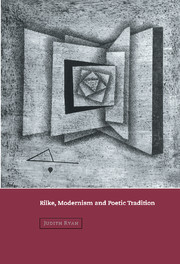Conclusion: restorative modernism
Published online by Cambridge University Press: 22 September 2009
Summary
T. S. Eliot conceived of the poet's mind as a ‘receptacle’ designed to ‘form a new compound’ from ‘numberless feelings, phrases, images’. Paul Valéry wrote that works whose relation to earlier works are so complicated that ‘nous nous y perdons’ (we lose ourselves in them) are the ones that we believe to have come ‘directement des dieux’ (directly from the gods). Rilke's poetry fits well with these descriptions of the catalytic principle.
Nonetheless, Rilke does not seem to have shared their scepticism about the nature of creativity. Even during his Rodin phase, when he saw hard work as paramount and accepted no excuses for laziness, his poems attempt to force the appearance of inexplicable moments during which the object is illumined or transformed: the moment when the hydrangea seems to renew its colours, the flamingos stalk off into the imaginary, or the statue of Apollo seems to admonish its viewer. Though inspiration was not the initiating factor in these poems, something that goes beyond the speaker's sheer willpower is what turns a mundane observation into a work of poetry. During his crisis of 1910–14, inspiration is more overtly at issue. The Poems to Nïght, the poems to the future beloved, and the Duino Elegies all circle around this topic with unconcealed desperation.
It cannot have helped that Rilke's primary sponsor during this period, Princess Marie von Thurn und Taxis, called him ‘Dottor Serafico’.
- Type
- Chapter
- Information
- Rilke, Modernism and Poetic Tradition , pp. 219 - 227Publisher: Cambridge University PressPrint publication year: 1999

